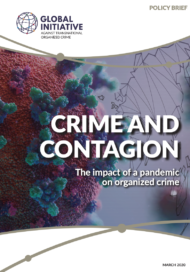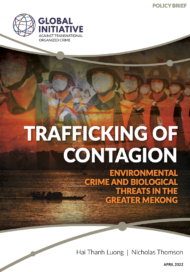Posted on 30 Jul 2020
As of 21 July 2020, almost 15 million cases of COVID-19 had been reported worldwide, and over 610 000 deaths registered. Although both have continued to decline in the last month in Europe, the virus is still spreading in a number of other regions, including Latin America and the Caribbean, Africa, Asia and, notably, North America. In the case of the latter, this is largely due to a resurgence of infections in recent weeks in the United States.
Besides the devastating loss of life, the pandemic has had – and will continue to have – a crippling effect on the global economy. It has triggered the worst recession since the Great Depression, according to the International Monetary Fund, who predict that there will be a cumulative loss to the global economy of more than US$12 trillion over 2020–2021.
What does the greatest economic disaster many of us will experience in our lifetime mean for the world’s criminal organizations looking to exploit the crisis; for corrupt businesspeople and government officials; and for the global community’s efforts to resist both the economic downturn and illicit financial activity?
Governments around the world are making available unprecedented sums of money in the form of emergency relief and loans to citizens and businesses struggling with the economic damage caused by COVID-19. In late July, the European Union agreed a €750 billion stimulus package. However, as the GI-TOC reported in our special feature on the Italian mafia’s activities during the pandemic, struggling businesses may be left with no alternative but to rely on support from criminal actors to keep afloat. It is clear, therefore, that providing the necessary state support to citizens and businesses plays a crucial part in suppressing the opportunities for criminal exploitation of the economic crisis.
Into the hands of criminal actors
This notwithstanding, there is also the risk that state financial relief ends up enriching criminal actors, as opposed to the recipients it is intended for. This happens because of ineffective due diligence and longstanding infiltration of certain sectors by criminal elements. For example, on 14 July, Italian investigators revealed that three steel companies controlled by an alleged member of ‘Ndrangheta, an Italian mafia group, had received over €45 000 in relief funds from the Italian government. The investigation into the companies led to eight arrests and seizures worth €7.5 million. A few months earlier, it was revealed that 101 members of the Calabrian mafia had for months been on the receiving end of over €516 000 of income support from the Italian state.
Back in April, an article in the German newspaper Die Welt called on Chancellor Angela Merkel to resist agreeing to so-called coronabonds, or shared eurozone debt, because it would serve to benefit Italian mafia groups. The article was heavily criticized by politicians and mafia experts alike, who made the point – as argued above – that it is the collapse of businesses that poses the greatest opportunities to criminal organizations. Governments, therefore, should not refrain from offering emergency financial support, but rather ensure that oversight mechanisms and due diligence are properly implemented to prevent state support from falling into the wrong hands.
The issue of government relief being intercepted by criminal actors is by no means limited to Italy. Since Germany approved an unprecedented €1.1 trillion relief package at the end of March, authorities have filed at least 2 500 charges in response to suspected financial crimes linked to coronavirus. Self-employed individuals and small enterprises are regulated by fewer controls than corporations, which makes them an ideal vehicle for criminal actors to defraud the state of millions of euros of financial support. In the United Kingdom, nine men were arrested in July as part of an investigation into a suspected fraud case involving £495 000 linked to the Coronavirus Job Retention Scheme. Across the Atlantic, the U.S. Secret Service circulated a memo warning of a Nigerian crime ring committing large-scale fraud against state unemployment insurance programmes, with potential losses of hundreds of millions of dollars.
State support fraud
The risk posed by opportunistic individuals seeking to defraud the state is also acute. Coronavirus-related fraud has been rife in the United States, with reports, for instance, of a film producer allegedly attempting to use US$1.7 million of relief funds to pay personal credit card bills, and two men applying for over half a million dollars’ worth of loans by falsely declaring the number of employees on their payroll. The country’s northern neighbour has also fallen victim to a number of fraudulent applications for the Canada Emergency Response Benefit.
In South Africa, nearly 6 million rands – equivalent to approximately US$365 000 – defrauded from the country’s Unemployment Insurance Fund (UIF) relief system was paid into the account of one man, who spent almost all the money, much of it transferred to the accounts of friends, in less than a week. South Africa’s National Prosecuting Authority is investigating whether the fraud was facilitated by corrupt officials at the UIF. In eSwatini, there have been reports of a number of questionable applications for the country’s cash transfer programme.
Passive state or complicit state?
The coronavirus pandemic is one of the greatest challenges most governments will ever face, both from a health perspective and with regard to the economic destruction it has engendered. With the vast sums of money being disbursed by governments to support flagging economies, there was always going to be a risk of illegitimacy in the system. In times of emergency, banks and other financial institutions are less likely to enforce existing regulations that prevent proceeds from criminal activities entering the financial system. As one lawyer explains, the impetus to move humanitarian items as quickly as possible – particularly to countries under economic sanctions, which also happen to be the countries hardest hit by the virus – has resulted in pressure being placed on financial institutions to relax their due-diligence processes. With the immense burden that COVID-19 places on even the most capable governments, corners are being cut, regulations relaxed and large contracts given out without competitive tenders or normal due-diligence checks – all of which create opportunities for corruption to thrive.
But it is important to make the distinction between fraudulent activity that has been allowed to occur owing to pressure on financial systems, and criminal activity that is facilitated, or even perpetrated, by criminal actors embedded within the state apparatus.
The GI-TOC’s June/July issue of the Risk Bulletin of Illicit Economies in Eastern and Southern Africa reports on how longstanding corruption issues in Somalia’s healthcare system have been manifested anew, as aid aimed at supporting the country in fighting COVID-19 has been diverted for personal gain. Since March, Somalia has been the recipient of considerable amounts of medical supplies donated to help tackle the outbreak. However, some supplies donated by international partners have been diverted by officials tasked with coordinating and managing the response.
In March, 13 of Transparency International’s offices and partners in Latin America said there was a risk of ‘serious corruption’ in the public procurement process. According to Alessandra Dolci, an anti-mafia prosecutor in Milan, mafia groups have been moving to take over contracts to dispose of medical waste produced during the COVID-19 emergency through front companies.
In May, Brazilian police raided the home of Rio de Janeiro’s state governor, Wilson Witzel, as part of a COVID-19 corruption probe. Witzel is alleged to have coordinated a criminal operation, together with his wife, in which payments were made to the latter’s law firm from a company that had won state coronavirus contracts.
The risk, and potential implications, of corruption has never been more pressing. United Nations experts have warned of the devastating human cost of corruption, arguing that ‘if medicines are diverted because a bribe is paid, innocent people deprived of treatment could die’.
No haven for criminal corporations
Some governments have made positive steps during the pandemic, such as denying financial assistance to companies registered in offshore tax havens. This was an important measure to take, because as Heather Marquette explains in an interview with the GI-TOC, ‘although not all companies that are registered in tax havens … are corrupt or criminal, secrecy does mask a wide range of illicit activities’.
Tax havens provide the opportunity for a whole host of different forms of illicit financial flows, including the concealment of illicit proceeds and tax fraud. While such businesses are making swathes of employees redundant, their owners continue to benefit from the wealth generated through offshore finance.
If there is one benefit to have emerged from the devastation of COVID-19, it is that the pandemic is shining a light on the gross inequalities in society and the damage caused by secrecy jurisdictions to governments’ ability to respond to national emergencies with vast sums of tax revenue that would otherwise be available were it not for tax havens.
***
The #CovidCrimeWatch archive of news articles from around the world pertaining to organized crime and the COVID-19 pandemic has been updated. Please click below to download the repository, which now hosts 565 articles.
#CovidCrimeWatch is curated by Lyes Tagziria.
Subscribe



